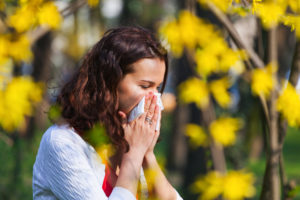 As winter shifts to spring, and flowers, grasses and trees begin to bloom, spring can take a toll on your eyes if you suffer from seasonal allergies. The spring season has a marked an increase in pollen and allergens in the air, that leave you with congestion, headaches, and itchy, swollen eyes, known as eye allergies.
As winter shifts to spring, and flowers, grasses and trees begin to bloom, spring can take a toll on your eyes if you suffer from seasonal allergies. The spring season has a marked an increase in pollen and allergens in the air, that leave you with congestion, headaches, and itchy, swollen eyes, known as eye allergies.
According to the American Academy of Ophthalmology, eye allergies are also called allergic conjunctivitis, and are pretty common. They occur when the eyes react to something that irritates them (called an allergen). The eyes produce a substance called histamine to fight off the allergen. As a result, the eyelids and conjunctiva become red, swollen, and itchy. The eyes can tear and burn. Unlike other kinds of conjunctivitis, eye allergies do not spread from person to person.
What Are the Symptoms of Eye Allergies?
The most common eye allergy symptoms include:
- red, swollen, or itchy eyes
- burning or tearing of the eyes
- sensitivity to light
What are Eye Allergy Triggers?
- Outdoor allergens, such as pollen from grass, trees, and ragweed
- Indoor allergens, such as dust mites, pet dander, and mold
- Irritants, such as cigarette smoke, perfume
Spring Allergy Management
To combat seasonal eye allergies, you must have a dual focus on both prevention and treatment for symptoms. By making some minor changes to your environment and activities, you can significantly reduce the amount of allergens you come in contact with, and lessen the symptoms you’re experiencing. Use these seven methods to soothe your eye irritations related to allergies.
- Avoid Allergens
The best strategy to minimize your eye discomfort during the spring is to limit your exposure to allergens. As winter comes to an end, create an actionable plan that helps you avoid seasonal allergens like pollen.
Steps you take may include:
-
- Changing your HVAC filters before turning on your cooling system for the first time
- Purchase and use an in-house air purifier
- Checking pollen levels online as part of your daily routine
- Cleaning your home more frequently
- Keeping your windows closed
- Spring cleaning before the weather actually warms up
These preventative measures are an important first step to good eye health during allergy season.
- Don’t Wear Contacts
If you are prone to allergy-related eye irritation, stop wearing your contacts for the first month or so of spring weather. While contacts do not cause allergy symptoms, they can aggravate any symptoms that do appear.
You may want to schedule an eye exam, to prepare for switching to full-time glasses use. This exam presents a good opportunity for you to check that your glasses prescription is current and to make any necessary updates to maintain your comfort and vision quality.
- Rinse with Sterile Non-Preserved Saline
Eye allergies can cause changes in tear production. Many individuals experience eye dryness or excess tears due to allergies. In some cases, your eyes may water frequently but still feel dry due to allergens.
Much of this type of irritation occurs when airborne allergens come into contact with the surface of the eyeball. To minimize your allergen exposure, rinse your eyes with saline solution. This may reduce the urge to rub your eyes, which is important because rubbing can trigger a release of more histamines and cause redness, swelling, and blood vessel breakage.
- Use Non-Preserved Artificial Tear Drops or Medicated Eye Drops
You may also want to use non-preserved artificial tears to help maintain correct eye lubrication. Before you begin a new eye health regimen, consult with your optometrist to determine which brand and formula is best for your symptoms.
In addition to sterile rinses or lubricant eye drops, using medicated eye drops may help relieve some of the discomfort associated with seasonal eye allergies. Decongestant or antihistamine drops can control redness, itchiness, and other symptoms.
- Try Cold Therapy
Many individuals notice redness, tenderness, and swelling in the eye area when suffering from allergies. Applying cool or cold compresses can provide immediate soothing relief for these symptoms, including improving the appearance of the skin around the eyes.
Use a clean soft cloth or compress designed for use in the eye area. These compresses are gentler than traditional cold therapy tools and are safer for your eyes. Soak the compress in cool water, wring it out, and place over the eyes. You can refresh the compress with water when the cloth no longer feels cold. To address more intense symptoms, wet your compress, wring out the cloth, and put it in the refrigerator for 10 to 15 minutes. This colder compress will last longer and provide relief for more advanced symptoms.
- Wash Your Hands and Face Frequently
As mentioned above, many eye allergy symptoms come from allergens landing on the eye. In addition to floating airborne allergens, your eyes could also suffer from contact with allergens that are transferred in on your skin or hair.
Wash your hands more frequently during allergy season. You should also wash your face twice a day and rinse the area around your eyes as needed. These steps reduce the concentration of allergens on your skin. You may also want to pin back any hair that may cover your face at eye height to minimize your allergen exposure.
- Wear Sunglasses
When you do need to be outside, wear glasses to protect the surface of your eyes from direct contact with allergens. You may prefer to wear sunglasses rather than your usual glasses because most sunglasses have larger lenses than everyday eyeglasses and, therefore, provide more protection.
If you need constant vision correction, but want the benefits of wearing sunglasses, talk to your eye doctor about investing in a pair of high-quality prescription sunglasses.
- Consult Your Eye Care Professional
If your symptoms continue, consult your eye care professional for help with diagnosis and treatment. There are many prescription medications, not available over the counter, to help control severe allergic symptoms.
If your allergies cause vision changes, feelings of a foreign object in your eye, or acute pain, make an appointment as soon as possible.


 Harsh weather conditions can reduce the natural moisture in your eyes and the irritation usually results in a burning or itching sensation that often leads to rubbing or scratching your eyes which can worsen the symptoms. Sometimes it feels like there is a foreign object in your eye and for some, dry eyes can even cause excessive tearing, as your eyes try to overcompensate for their lack of protective tears. Prolonged, untreated dry eyes can lead to blurred vision as well. Between the harsh winter winds outside and the dry heat radiating inside, our eyes are very quickly irritated and dried in the winter months. The result is itchy, dry eyes that may cause pain, blurred vision, a burning sensation, or even watery vision as our eyes try to compensate for the dryness.
Harsh weather conditions can reduce the natural moisture in your eyes and the irritation usually results in a burning or itching sensation that often leads to rubbing or scratching your eyes which can worsen the symptoms. Sometimes it feels like there is a foreign object in your eye and for some, dry eyes can even cause excessive tearing, as your eyes try to overcompensate for their lack of protective tears. Prolonged, untreated dry eyes can lead to blurred vision as well. Between the harsh winter winds outside and the dry heat radiating inside, our eyes are very quickly irritated and dried in the winter months. The result is itchy, dry eyes that may cause pain, blurred vision, a burning sensation, or even watery vision as our eyes try to compensate for the dryness. It seems like every season is allergy season. In the spring, it’s the tree and flower pollen. Summer adds grass pollen. In the fall, it’s weed pollen. People who have allergies have symptoms such as sneezing, sniffling, and nasal congestion, but allergies can affect the eyes, too. They can make your eyes red, itchy, burning, and watery, and cause swollen eyelids.
It seems like every season is allergy season. In the spring, it’s the tree and flower pollen. Summer adds grass pollen. In the fall, it’s weed pollen. People who have allergies have symptoms such as sneezing, sniffling, and nasal congestion, but allergies can affect the eyes, too. They can make your eyes red, itchy, burning, and watery, and cause swollen eyelids.